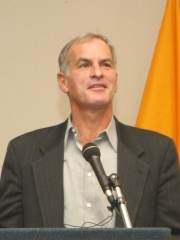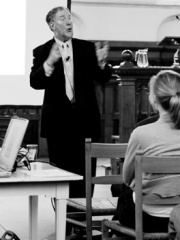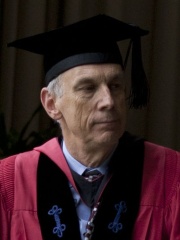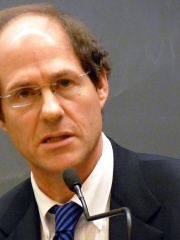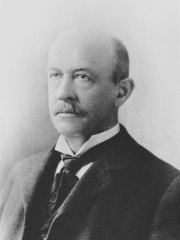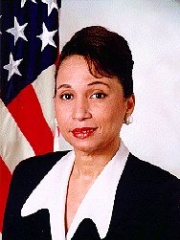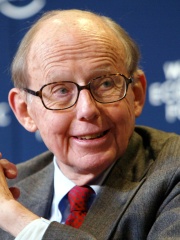
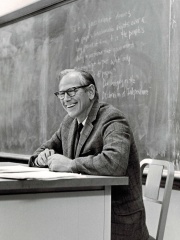
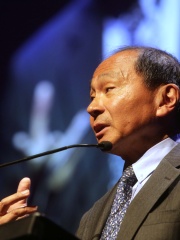
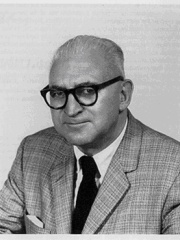
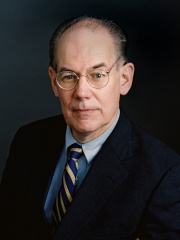
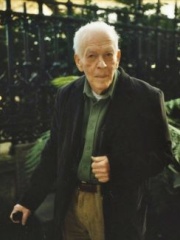
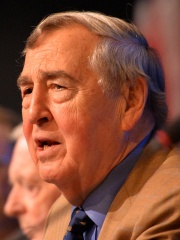
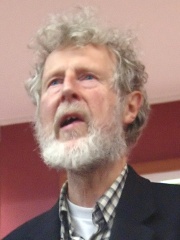
The Most Famous
POLITICAL SCIENTISTS from United States
This page contains a list of the greatest American Political Scientists. The pantheon dataset contains 46 Political Scientists, 18 of which were born in United States. This makes United States the birth place of the most number of Political Scientists.
Top 10
The following people are considered by Pantheon to be the top 10 most legendary American Political Scientists of all time. This list of famous American Political Scientists is sorted by HPI (Historical Popularity Index), a metric that aggregates information on a biography's online popularity. Visit the rankings page to view the entire list of American Political Scientists.

1. Samuel P. Huntington (1927 - 2008)
With an HPI of 75.98, Samuel P. Huntington is the most famous American Political Scientist. His biography has been translated into 66 different languages on wikipedia.
Samuel Phillips Huntington (April 18, 1927 – December 24, 2008) was an American political scientist, adviser, and academic. He spent more than half a century at Harvard University, where he was director of Harvard's Center for International Affairs and the Albert J. Weatherhead III University Professor. During the presidency of Jimmy Carter, Huntington was the White House coordinator of security planning for the National Security Council. Huntington is known best for his 1993 theory, the "Clash of Civilizations" otherwise known as COC, of a post–Cold War new world order. He argued that future wars would be fought not between countries, but between cultures, and that Islamic civilization would become the greatest threat to Western domination of the world. Huntington is credited with helping to shape American opinions on civilian-military relations, political development, and comparative government. According to the Open Syllabus Project, Huntington is the second most frequently cited author on college syllabi for political science courses.

2. Robert A. Dahl (1915 - 2014)
With an HPI of 72.67, Robert A. Dahl is the 2nd most famous American Political Scientist. His biography has been translated into 35 different languages.
Robert Alan Dahl (; December 17, 1915 – February 5, 2014) was an American political theorist and Sterling Professor of Political Science at Yale University. He established the pluralist theory of democracy—in which political outcomes are enacted through competitive, if unequal, interest groups—and introduced "polyarchy" as a descriptor of actual democratic governance. An originator of "empirical theory" and known for advancing behavioralist characterizations of political power, Dahl's research focused on the nature of decision making in actual institutions, such as American cities. He is the most important scholar associated with the pluralist approach to describing and understanding both city and national power structures. In addition to his work on the descriptive theory of democracy, he was long occupied with the formulation of the constituent elements of democracy considered as a theoretical but realizable ideal. By virtue of the cogency, clarity, and veracity of his portrayal of some of the key characteristics of realizable-ideal democracy, as well as his descriptive analysis of the dynamics of modern pluralist-democracy, he is considered one of the greatest theorists of democracy in history.

3. Francis Fukuyama (b. 1952)
With an HPI of 71.95, Francis Fukuyama is the 3rd most famous American Political Scientist. His biography has been translated into 64 different languages.
Francis Yoshihiro Fukuyama (; born October 27, 1952) is an American political scientist, political economist, and international relations scholar, best known for his book The End of History and the Last Man (1992), which the British newspaper The Sunday Times described as one of the 12 most influential books since World War II. In that work, he argued that the worldwide spread of liberal democracies and Western free-market capitalism, as well as the Western lifestyle may represent the final step in humanity's sociocultural evolution and political struggle, alongside becoming the final form of human government, an assessment meeting with numerous and substantial criticisms. In his subsequent book Trust: Social Virtues and Creation of Prosperity (1995), he modified his earlier position to acknowledge that culture cannot be cleanly separated from economics. Fukuyama is also associated with the rise of the neoconservative movement, from which he has since distanced himself. He has been a senior fellow at the Freeman Spogli Institute for International Studies since July 2010 and the Mosbacher Director of the Center on Democracy, Development and the Rule of Law at Stanford University. In August 2019, he was named director of the Ford Dorsey Master's in International Policy at Stanford. Before that, he served as a professor and director of the International Development program at the School of Advanced International Studies of Johns Hopkins University. Additionally, he had also been the Omer L. and Nancy Hirst Professor of Public Policy at the School of Public Policy at George Mason University. Moreover, he serves as a council member of the International Forum for Democratic Studies, founded by the National Endowment for Democracy and was a member of the Political Science Department of the RAND Corporation. He is also one of the 25 leading figures on the Information and Democracy Commission launched by Reporters Without Borders. In 2024, he received the Riggs Award for Lifetime Achievement in International and Comparative Public Administration.

4. Harold Lasswell (1902 - 1978)
With an HPI of 69.16, Harold Lasswell is the 4th most famous American Political Scientist. His biography has been translated into 34 different languages.
Harold Dwight Lasswell (February 13, 1902 – December 18, 1978) was an American political scientist and communications theorist. He earned his bachelor's degree in philosophy and economics and his Ph.D. from the University of Chicago. He was a professor of law at Yale University. He served as president of the American Political Science Association, American Society of International Law, and World Academy of Art and Science. According to a biographical memorial written by Gabriel Almond at the time of Lasswell's death, and published by the National Academies of Sciences in 1987, Lasswell "ranked among the half dozen creative innovators in the social sciences in the twentieth century." At the time, Almond asserted that "few would question that he was the most original and productive political scientist of his time." Areas of research in which Lasswell worked included the importance of personality, social structure, and culture in the explanation of political phenomena. Lasswell was associated with the disciplines of communication, political science, psychology, and sociology – however he did not adhere to the distinction between these boundaries, but instead worked to erase the lines drawn to divide these disciplines.
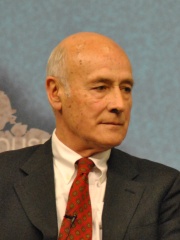
5. Joseph Nye (1937 - 2025)
With an HPI of 67.38, Joseph Nye is the 5th most famous American Political Scientist. His biography has been translated into 27 different languages.
Joseph Samuel Nye Jr. (January 19, 1937 – May 6, 2025) was an American political scientist. He and Robert Keohane co-founded the international relations theory of neoliberalism, which they developed in their 1977 book Power and Interdependence. Together with Keohane, he developed the concepts of asymmetrical and complex interdependence. They also explored transnational relations and world politics in an edited volume in the 1970s. More recently, he pioneered the theory of soft power. His notion of "smart power" ("the ability to combine hard and soft power into a successful strategy") became popular with the use of this phrase by members of the Clinton Administration and the Obama Administration. These theories from Nye are very commonly seen in courses across the U.S., such as I.B. D.P. Global Politics. Nye was the Dean of the John F. Kennedy School of Government at Harvard University, where he later held the position of University Distinguished Service Professor, emeritus. In October 2014, US Secretary of State John Kerry appointed Nye to the Foreign Affairs Policy Board. He was also a member of the Defense Policy Board. He was a Harvard faculty member since 1964. He was a fellow of the American Academy of Arts & Sciences, a foreign fellow of the British Academy, and a member of the American Academy of Diplomacy. The 2011 Teaching, Research, and International Policy (TRIP) survey of over 1,700 international relations scholars ranked Nye as the sixth most influential scholar in the field of international relations in the past 20 years. He was also ranked as one of the most influential figures in American foreign policy. In 2011, Foreign Policy magazine included him on its list of top global thinkers. In September 2014, Foreign Policy reported that international relations scholars and policymakers ranked Nye as one of the field's most influential scholars.

6. John Mearsheimer (b. 1947)
With an HPI of 66.38, John Mearsheimer is the 6th most famous American Political Scientist. His biography has been translated into 33 different languages.
John Joseph Mearsheimer (; born December 14, 1947) is an American political scientist and international relations scholar. He is the R. Wendell Harrison Distinguished Service Professor of Political Science at the University of Chicago. Mearsheimer is best known for developing the neorealist (or structural realist) theory of offensive realism, which describes the interaction between great powers as being primarily driven by the rational desire to achieve regional hegemony in an anarchic international system. In accordance with his theory, in the 2001 book The Tragedy of Great Power Politics, Mearsheimer says that China's growing power will likely bring it into conflict with the United States. In his 2007 book The Israel Lobby and U.S. Foreign Policy, Mearsheimer argues that the Israel lobby wields disproportionate influence over U.S. foreign policy in the Middle East. His more recent work focuses on criticism of the "liberal international order" (laid down in his 2018 book The Great Delusion: Liberal Dreams and International Realities) and why he believes that the West is to blame for the Russo-Ukrainian War.

7. Gene Sharp (1928 - 2018)
With an HPI of 65.32, Gene Sharp is the 7th most famous American Political Scientist. His biography has been translated into 37 different languages.
Gene Sharp (January 21, 1928 – January 28, 2018) was an American political scientist. He was the founder of the Albert Einstein Institution, a non-profit organization dedicated to advancing the study of nonviolent action, and professor of political science at the University of Massachusetts Dartmouth. He was known for his extensive writings on nonviolent struggle, which have influenced numerous anti-government resistance movements around the world. Sharp received the 2008 Peace Abbey Courage of Conscience Award for his lifelong commitment to the defense of freedom, democracy, and the reduction of political violence through scholarly analysis of the power of nonviolent action. Unofficial sources have claimed that Sharp was nominated for the Nobel Peace Prize in 2015, and had previously been nominated three times, in 2009, 2012 and 2013. Sharp was widely considered the favorite for the 2012 award. In 2011, he was awarded the El-Hibri Peace Education Prize. In 2012, he was a recipient of the Right Livelihood Award for "developing and articulating the core principles and strategies of nonviolent resistance and supporting their practical implementation in conflict areas around the world".

8. Graham Allison (b. 1940)
With an HPI of 62.81, Graham Allison is the 8th most famous American Political Scientist. His biography has been translated into 18 different languages.
Graham Tillett Allison Jr. (born March 23, 1940) is an American political scientist and the Douglas Dillon Professor of Government at the John F. Kennedy School of Government at Harvard University. He is known for his contributions in the late 1960s and early 1970s to the bureaucratic analysis of decision making, especially during times of crisis. His book Remaking Foreign Policy: The Organizational Connection, co-written with Peter L. Szanton, was published in 1976 and influenced the foreign policy of the Carter administration. Since the 1970s, Allison has also been a leading analyst of U.S. national security and defense policy, with a special interest in nuclear weapons and terrorism.

9. James Flynn (1934 - 2020)
With an HPI of 60.37, James Flynn is the 9th most famous American Political Scientist. His biography has been translated into 16 different languages.
James Robert Flynn (28 April 1934 – 11 December 2020) was an American-born New Zealand moral philosopher and intelligence researcher. Originally from Washington, D.C., and educated at the University of Chicago, Flynn emigrated to Dunedin in 1963, where he taught political studies at the University of Otago. He was noted for his publications about the continued year-after-year increase of IQ scores throughout the world, which is now referred to as the Flynn effect. In addition to his academic work, he championed social democratic politics throughout his life.
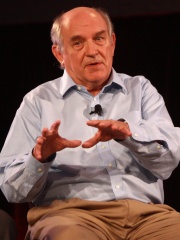
10. Charles Murray (b. 1943)
With an HPI of 60.22, Charles Murray is the 10th most famous American Political Scientist. His biography has been translated into 18 different languages.
Charles Alan Murray (; born January 8, 1943) is an American political scientist. He is the W.H. Brady Scholar at the American Enterprise Institute, a conservative think tank in Washington, D.C. Murray's work is highly controversial. His book Losing Ground: American Social Policy, 1950–1980 (1984) discussed the American welfare system. In the book The Bell Curve (1994), he and co-author Richard Herrnstein argue that in 20th-century American society, intelligence became a better predictor than parental socioeconomic status or education level of many individual outcomes, including income, job performance, pregnancy out of wedlock, and crime, and that social welfare programs and education efforts to improve social outcomes for the disadvantaged are largely counterproductive. The Bell Curve also argues that average intelligence quotient (IQ) differences between racial and ethnic groups are at least partly genetic in origin, a view that is now considered discredited by mainstream science.
People
Pantheon has 18 people classified as American political scientists born between 1840 and 1970. Of these 18, 9 (50.00%) of them are still alive today. The most famous living American political scientists include Francis Fukuyama, John Mearsheimer, and Graham Allison. The most famous deceased American political scientists include Samuel P. Huntington, Robert A. Dahl, and Harold Lasswell.
Living American Political Scientists
Go to all RankingsFrancis Fukuyama
1952 - Present
HPI: 71.95
John Mearsheimer
1947 - Present
HPI: 66.38
Graham Allison
1940 - Present
HPI: 62.81
Charles Murray
1943 - Present
HPI: 60.22
Norman Finkelstein
1953 - Present
HPI: 60.16
Robert D. Putnam
1941 - Present
HPI: 59.72
Robert Keohane
1941 - Present
HPI: 58.19
Cass Sunstein
1954 - Present
HPI: 49.77
Claudine Gay
1970 - Present
HPI: 44.68
Deceased American Political Scientists
Go to all RankingsSamuel P. Huntington
1927 - 2008
HPI: 75.98
Robert A. Dahl
1915 - 2014
HPI: 72.67
Harold Lasswell
1902 - 1978
HPI: 69.16
Joseph Nye
1937 - 2025
HPI: 67.38
Gene Sharp
1928 - 2018
HPI: 65.32
James Flynn
1934 - 2020
HPI: 60.37
William Graham Sumner
1840 - 1910
HPI: 59.74
Alexis Herman
1947 - Present
HPI: 56.66
Sidney Verba
1932 - 2019
HPI: 53.44
Overlapping Lives
Which Political Scientists were alive at the same time? This visualization shows the lifespans of the 8 most globally memorable Political Scientists since 1700.

